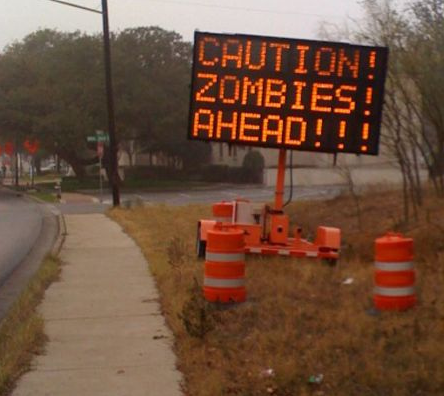Zombie voter fraud attack proved false, again

According to some state lawmakers, there is an alternate universe where zombies run amok, looking not to physically attack us but vote us out of existence through fraudulent ballot casting.
To fight off the World War Z scourge, they say, we don't need Brad Pitt but photo voter ID cards. South Carolina Department of Motor Vehicles director Kevin Shwedo said as much last year during hearings where he pushed for voter ID, claiming he had a list of over 900 voters who cast ballots from the grave.
As reported by Corey Hutchins in the Columbia Free Times, state Rep. Alan Clemmons, a Horry County Republican, ran with Shwedo's unsubstantiated claim, telling the public, "We must have certainty in South Carolina that zombies aren't voting."
South Carolina Attorney General Alan Wilson, also a Republican, made the same claim and used it to crusade against President Obama's Department of Justice (DOJ). Along with his friends at True the Vote, Wilson spun a narrative about how the federal government was preventing him from defending his state against the zombie voter fraud attacks.
But it turns out that, like most zombie stories, this was pure comic book plot. The South Carolina Law Enforcement Division conducted an 18-month investigation into whether dead people voted -- and found not one legitimate case of any such thing happening.
The Division's report was released quietly just before the Fourth of July holiday, following an information request by Hutchins, who noted in his article that the agency made no comment about their findings.
And it's not just South Carolina. This same voter fraud mythology has been peddled in Pennsylvania by lawmakers as they made a case for a voter ID law -- only to walk it back when it was time to go on the record during a legal challenge to the law.
Similar voter fraud claims have also been made -- and debunked -- in Texas, Wisconsin, Mississippi, and Minnesota. And who can forget voter fraud hustler James O'Keefe's attempt to stage a zombie voter fraud outbreak in North Carolina?
In all of these situations, Republican lawmakers and conservative activists drummed up tales of voter fraud, made outrageous claims in public, but failed to apologize when the data contradicted them. Meanwhile, photo voter ID laws are still being passed based on bad information.
In South Carolina, a voter ID law has gone into effect despite the error of Attorney General Wilson's fraud claims. A federal court review of the law last year under Section Five of the Voting Rights Act (VRA), which required DOJ pre-clearance of voting changes in jurisdictions with a history of discrimination, found that it would not have a retrogressive effect on the voting rights of people of color -- but only after lawmakers made numerous modifications in response to the problems exposed by the Section Five case. And now Section Five has been rendered defunct by the recent Supreme Court decision that tossed out Section Four, which set out the formula for determining which jurisdictions were covered under Section Five.
South Carolina's voter ID law was originally blocked by the DOJ after it found that there are counties where as many as 14 percent of residents didn't have the specific state government-issued ID called for in the law. Seven of the counties with the highest percentages of ID-less registered voters were among the 10 counties with the highest percentage of voters of color.
Meanwhile, North Carolina is facing a pending photo voter ID law despite a lack of evidence of voter fraud -- and its chances of passing are perhaps too good for the comfort of the half-million people in the state lacking ID.
Last year I talked with voting rights advocates in Texas who were considering creating legislation that would make it illegal for lawmakers to falsely claim that voter fraud exists. They argued that the false claim itself was the ugliest form of voter fraud. Something for Congress to consider as it crafts a new coverage formula for the VRA's Section Five?
